The complicated, often contentious transition of power from president to president is steeped in complex laws and traditions. Since the first presidential transition in 1797, the United States has followed these laws and traditions that govern the peaceful transition of power, although at times, with some dispute.
As L. Elaine Halchin, coordinator of the Congressional Research Service, said, “The smooth and orderly transfer of power generally is a notable feature of presidential transitions and a testament to the legitimacy and durability of the electoral and democratic processes. Yet, at the same time, a variety of events, decisions and activities contribute to what some may characterize as the unfolding drama of a presidential transition.”
President Donald Trump’s lack of participation in the presidential transition has left many in the U.S., including some in the BYU campus community, to question whether President-elect Joe Biden will be prepared for inauguration on Jan. 20.
Traditions and laws
For years, the United States has placed infrastructural and traditional road marks to help guarantee a peaceful and secure transition of power so that a new president is immediately ready to begin following their inauguration.
First, and most apparent, the losing candidate publicly concedes the election results and acknowledge the winner of the election. In another longstanding tradition, the incumbent president invites the president-elect to the White House for an exchange of pleasantries and a private meeting to discuss the affairs of the country.
On Jan. 20, tradition would see the incumbent president and president-elect riding together to Capitol Hill for the new president’s swearing-in ceremony. The newly inaugurated president is set to work immediately and is typically met with a note handwritten by the president’s predecessor.

BYU political science professor Kelly Patterson said the traditional norms and practices, along with the administrative procedures, help both the nation’s civility and security.
“There’s an idea behind all these practices: the nation is more important than any one candidate and that the Republic is an indivisible entity that transcends political parties or personal feelings,” he said.
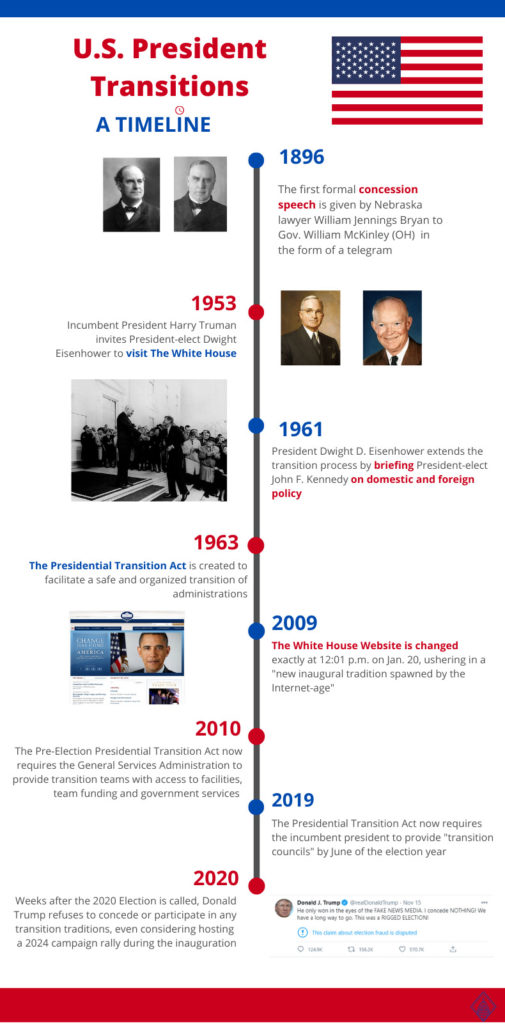
Patterson said the traditions that lead the presidential transition help subdue political differences in the name of unity, continuity and civility.
“That’s why we have this tradition of presidents writing notes to each other and riding together to the presidential inauguration,” Patterson said. “All of these are visible reminders to the nation that the public good is greater than any individual person.”
According to Patterson, in order for the transfer of power to go smoothly, there needs to be a plan in place. “You need to make sure a transition is handled as efficiently and responsibly as possible. That includes such issues as questions of foreign policy. Your foreign adversaries aren’t that sympathetic if the president-elect isn’t up to speed yet.”
Patterson said in addition to the traditions behind the transition, multiple administrative bodies are put in place to ensure a smooth and peaceful transfer of power.
According to the Presidential Transition Act, following the results of the election, the General Services Administration releases congressionally mandated funds to the president-elect’s transition team. These funds help provide the team with government briefings, pertinent documents, office space, etc.
Since the Presidential Transition Act, multiple revisions have been made as well as the start of new traditions, such as the White House website making a complete change at 12:01 p.m. on Jan. 20, the minute after the President is sworn into office.
Trump’s response
Despite the numerous laws and traditions governing the peaceful transition of power and the 2020 election results, Trump has either actively fought against or been slow to respond to the traditions customary of a peaceful transfer of power.
The first and most salient tradition is the concession of the election results. In a Nov. 15 Tweet, Trump said, “He only won in the eyes of the FAKE NEWS MEDIA. I concede NOTHING! We have a long way to go. This was a RIGGED ELECTION!”
Trump is even considering forgoing the traditional limousine ride to the inauguration ceremony to hold a 2024 campaign rally.
In addition, Trump has sought to overturn the results of the election through the courts, filing over 50 lawsuits in seven states, each suit contesting voting processes, vote counting and voter registration. Nearly all lawsuits have been either dropped or dismissed. The Supreme Court has now twice dismissed Trump’s attempts to overturn the election.
BYU political science professor Chris Krewson said that attempts to resolve election disputes in court do not themselves harm democracy.
“The fact that parties turn to the judiciary to resolve election disputes is a testimony to the strength of our democracy,” Krewson said. “Furthermore, that members of the Supreme Court unanimously ruled against efforts from some states to contest Pennsylvania’s electoral process should dampen fears that the Supreme Court is a partisan tool.”
Krewson said the key thing for the Court is that its decisions are legally plausible and not outright political. “In an important case, the Court once stated that it ‘must take care to speak and act in ways that allow people to accept its decisions on the terms the Court claims for them, as grounded truly in principle, not as compromises with social and political pressures.'”
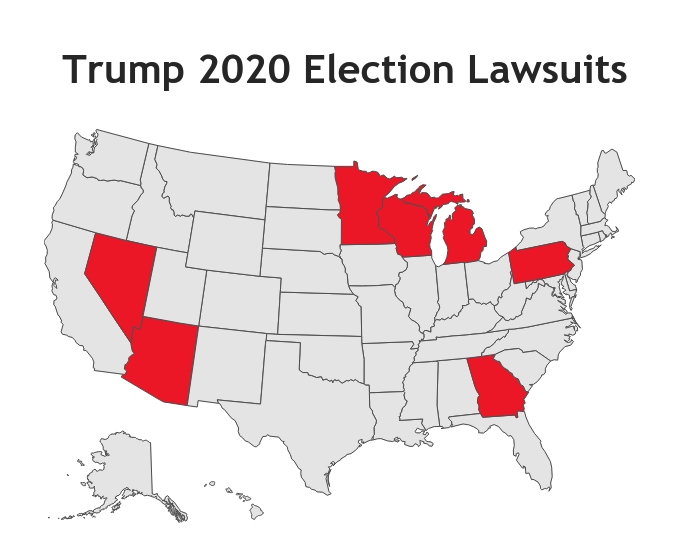
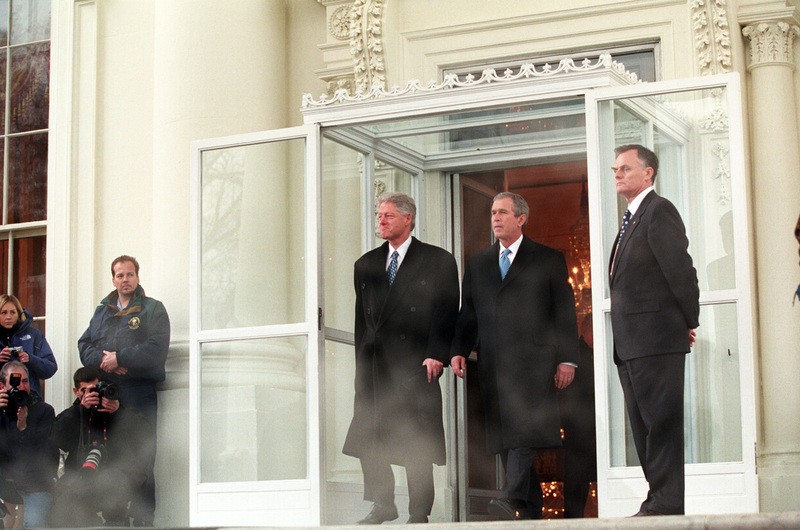
President Bill Clinton and President–elect George Bush depart the White House for the inaugural ceremony at the United States Capitol on January 20, 2001. (David Schull) 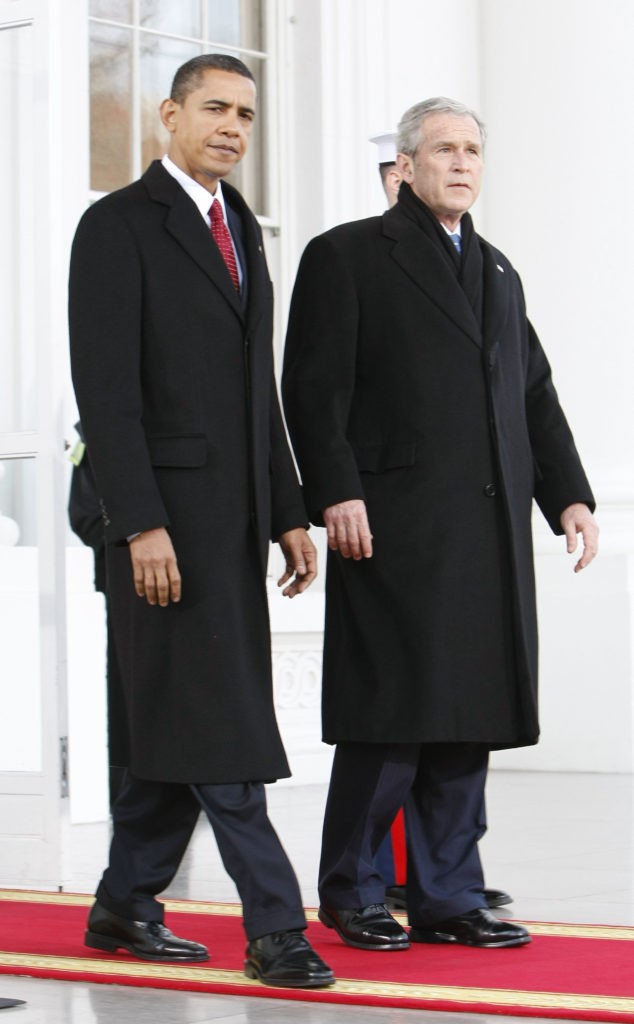
President George Bush, right, walks out with President-elect Barack Obama, left, on the North Portico of the White House before sharing the Presidential limousine en route to Capitol Hill for inauguration in Washington, Tuesday, Jan. 20, 2009.(AP Photo/Pablo Martinez Monsivais) 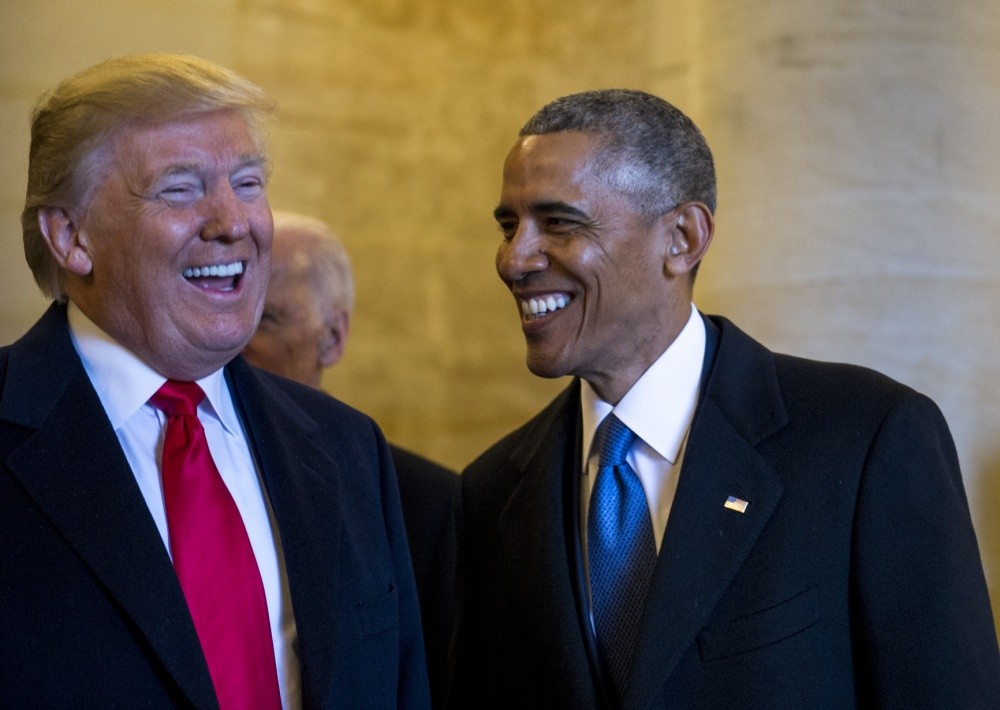
U.S. President Donald J. Trump and Former U.S. President Barack Obama wait to exit the east front steps for the departure ceremony during the 58th Presidential Inauguration in Washington, D.C., Jan. 20, 2017. (Marianique Santos)
BYU student Sydney Hendershot said that while President Trump should be allowed to seek redresses in the courts, his responses to the results of the election and subsequent transition process have been uncivil.
“I think Trump’s court appeals make sense,” Hendershot said. “But I don’t think it’s in very good taste to hold a rally during an inauguration. If it does turn out that Biden won 100% fairly, then just concede your losses.”
Hendershot said she would like to see a recount of the election results but agrees that the peaceful transition of power should be honored.
“This is a democratic country, and we have transitions of power,” Hendershot said. “I think Trump’s refusal to concede may make him seem more of the fascist that some people call him.”
BYU political science professor Quin Monson has noted that this presidential transition has been unlike any other transition in the United States in two broad ways: traditional norms and formal rules.
“President Trump, consistent with his behavior in many other ways, has violated longstanding norms of presidential transitions,” Monson said. “We have a long tradition in American politics, especially in modern times of a peaceful transition of power from one president to the next, especially when they’re from different parties.”
Monson said some of the rules that govern a presidential transition are written down and codified, while some rules remain unspoken, like the handshake on inauguration day, a note left on the desk in the Oval Office, etc.
“The clearest difference to me right now is that Trump is violating the unwritten rules, the niceties, the courtesies, anything that isn’t absolutely required by law,” Monson said. “He’s not doing it in a way that fits with previous presidents or doing it with civility or with graciousness.”
In addition to traditional niceties inherent in a presidential transition, Monson said Trump may be violating the formal rules governing the presidential transition, like access to government documents, foreign policy briefings and personnel, and more.
“For a smooth transition of government, especially in terms of national security we need the upcoming political appointees, and not all of them are in place,” Monson said. “They need access to the persons that they are replacing so there’s not a loss of continuity.”
Monson said Trump’s refusal to participate in both the traditional and administrative aspects of the transition may even be a threat to national security.
“There are numerous examples of Donald Trump not adhering to the norms of good behavior that we’ve come to expect of presidents,” Monson said. “I think that has a way of harming our sense of propriety and civility as a country. It has even deeper consequences if the transition is not smooth and we have a breakdown in our ability to respond to crisis or any event that may occur on or around Jan. 20.”
“The new administration needs to be ready to go from day one. I don’t see a lot of evidence that they are given proper government access that they need to be ready to go,” Monson said. “Students and faculty in the BYU community should care about it and should voice their views about it.”
Monson said a complete government breakdown isn’t imminent, but the uncertainty of the presidential transition may contribute to the gradual weakening of democracy.
“I think the actions of the Trump administration have served to weaken democratic norms and that’s not good for the health of the country,” Monson said. “I think democratic norms are important, but even more important are just the basics of safety and security of the nation.”
Patterson said the drama surrounding the mechanics of the presidential transition has brought it more attention than previous transitions.
“Most people don’t really think about the release of federal funds during democratic transitions,” Patterson said. “But we had to this time because of all of the histrionics that the Trump administration has injected to this process.”
Patterson said both aspects of the transition, whether traditional or administrative, are important. “Never discount the idea of norms and how valuable they are to the way we think about our country,” Patterson said. “They’re both critically important. And in both dimensions of the transition, the Trump administration has failed.”
Patterson said failure to make good on these traditions and administrative processes poses a threat to the nation.
“A democracy is a set of norms, practices, and traditions that we just come to assume and work to maintain the social order,” Patterson said. “If people start to flout those norms, then what we think is the social order starts to break down. That’s cause for concern.”




